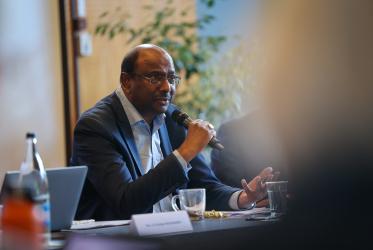A high-level ecumenical delegation representing church organizations will arrive in Juba, South Sudan on Friday, 2 May, amidst continuing conflict in the country with an imminent threat of widespread hunger and malnutrition among its people. The delegation will meet with church leaders and government officials, urging immediate actions for peace and reconciliation.
The World Council of Churches (WCC) general secretary Rev. Dr Olav Fykse Tveit, the ACT Alliance general secretary John Nduna, the WCC Central Committee moderator Dr Agnes Abuom, general secretary of the World YWCA Nyaradzayi Gumbonzvanda, the WCC’s former general secretary Rev. Dr Samuel Kobia, general secretary of the All Africa Conference of Churches Rev. Dr Andre Karamaga and WCC programme executive for advocacy for Africa Dr Nigussu Legesse will be among the delegates.
The delegates, while in Juba, will accompany churches in advocating for a cease-fire, asking parties in conflict to come back to peace negotiations, allowing humanitarian access in fighting areas and encouraging governments to pledge more aid.
“The crisis in South Sudan has unfortunately not been solved,” said WCC general secretary Tveit. “The current crisis has a potential for escalation with a risk of famine and hunger involving a large number of refugees and people displaced by the conflict,” he said.
“At this time it is important to have progress in the political process to re-establish cooperation among parties, so that the safety of people caught in fighting can be ensured.”
“The ecumenical movement has long supported initiatives for peace in South Sudan as well as the establishment of the state of South Sudan,” Tveit said.
He went on to say that churches and political leaders must amplify the voices of people longing for justice and peace. “We express our support to them when they seek a way towards reconciliation, and a focus on rebuilding their nation and feeding their people,” he added.
“We want the churches in South Sudan to know that they are not alone,” said Abuom, the WCC Central Committee moderator.
“Through this pastoral visit on behalf of the global Christian community, we want to express our solidarity with the churches in South Sudan. While we pray with them for peace in their country, we also want to hear from them how we can support them in disseminating the message of stopping hostilities and seeking solutions for peace,” said Abuom.
The urgency for peace in South Sudan has been expressed by the WCC on several occasions, including in a recent Minute adopted by the WCC Central Committee. The Minute calls for “immediate cessation of hostilities”, asking “all warring parties to respect, honour and implement in good faith the cease-fire agreement”.
The WCC general secretary expressed his concerns over violence in the country in a letter to South Sudanese president Salva Kiir Mayardit, whom he met in April 2013.
The ACT Alliance members in South Sudan are supporting life-saving relief operations. Since December, work has focused on distributing water, sanitation and hygiene kits, drilling boreholes, distributing relief goods, supporting mobile health clinics, offering psychosocial care and carrying out peace-building work in some camps.
However, the prospect of heavy rains will soon hamper operations, the ACT general secretary John Nduna warned. “In a month or so, some areas will be water-logged and muddy, preventing relief vehicles getting access to remote areas. We now have a small window of opportunity to get more relief goods in before the weather turns.”
“With over a million people forced from their homes and heavy fighting continuing, this dire situation will only worsen. This is an extremely serious situation. You wouldn’t have thought it could have taken a turn for the worse, but it has. We urgently need funds to carry out our life-saving work.”
The ACT general secretary has called on its members and the international community to keep up the pressure on the parties to the conflict in order to bring an immediate stop to killings and violence in South Sudan.
The United Nations humanitarian coordination agency, UNOCHA, said in a situation report on 25 April that as many as 4.9 million people need humanitarian assistance.
Media contact WCC: Nigussu Legesse: Nigussu.Legesse[at]wcc-coe.org, +41793935541
ACT Alliance appeal: Donate for humanitarian assistance in South Sudan
Read WCC Central Committee Minute on South Sudan







